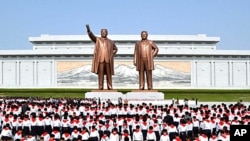According to the recently released 2011 International Religious Freedom Report, too many people still live under governments that abuse or restrict freedom of religion. One country of particular concern is North Korea.
According to the International Religious Freedom Report, genuine religious freedom does not exist in North Korea. Although the constitution and other laws provide for religious freedom, in practice the government severely restricted religious activity, except for officially recognized groups which were tightly supervised by the government.
The DPRK government continues to repress unauthorized religious groups, and deal harshly with those who engage in religious activities it deems unacceptable. Reports by defectors, missionaries, and nongovernmental organizations, indicate that religious persons who engage in proselytizing in the country and those who are in contact with foreigners are subject to harsh penalties.
Human rights groups outside North Korea provided reports in previous years that members of underground Christian churches were arrested, beaten, tortured, or killed for their religious beliefs. An estimated 150,000, to 200,000 persons are believed to be held in political prison camps, some allegedly for religious reasons. Prison conditions are harsh, and defectors who had been in prison stated that prisoners held on the basis of religious beliefs were generally treated worse than others.
Foreign media reported that 23 Christians were arrested in May 2010, for belonging to an underground church in Kuwol-dong, Pyongsong City, South Pyongan Province. Reportedly, three were executed and the others were sent to the Yodok political prison camp.
During 2011, a defector reported that Myong-il Park, who obtained a Bible during a visit to China, was arrested by the State Security Agency in 2000 and has been imprisoned in a political prison camp since then.
The North Korean government does not allow representatives of foreign governments, journalists, or other guests freedom of movement that would enable them to assess human rights conditions or confirm reported abuses.
Since 2001, the secretary of state has designated the DPRK a “Country of Particular Concern” under the International Religious Freedom Act. The United States will continue to express its deep concerns about the human rights situation in the DPRK, including religious freedom.




